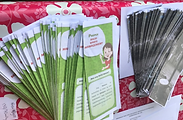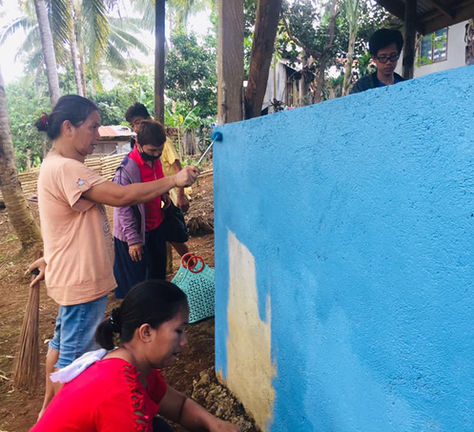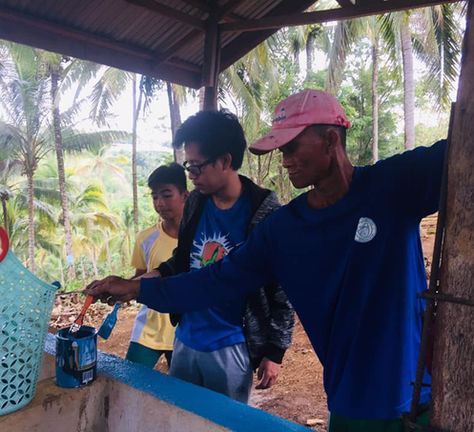
Improper Solid Waste Management

Solid Waste Management (SWM) is vital for maintaining an environment conducive for the health of the people. It is of utmost important for us to work toward improving and sustaining proper solid waste management in the community. Improper solid waste management has still been a concern for long time in the Philippines. This may be attributed to improper garbage disposal or the increased in the consumption and production of waste by the human population resulting to alterations in the natural balance of our ecosystem. People have neglected the importance of proper waste management proven by careless disposal of their waste products that have started to destroy and poison the environment today.
Goal:
To increase the percentage of households practicing proper solid waste management from 25.6% to 75 % in Barangay Bag-ong Dalaguete Mahayag, Zamboanga del Sur by 2020.
Cues:
-
74.4% (72 out of 97) of the households do not practice segregation
-
42.5% (41 out of 97) dispose garbage through open dumping
-
Only 31.86% (30 out of 97) practice composting
-
No garbage collection schedule exists in the barangay
-
No existing collection points available in the barangay
-
No existing Material Recovery Facility available in the barangay
-
No existing Vermicomposting Facility available in the barangay

Families practicing waste segregation before intervention

Specific objectives:
1: To identify the common type of waste generated in the barangay.
2. Establish a Solid Waste Management (SWM) organization and formulate strategic plan.
3. Improve knowledge on proper waste segregation and its importance.
4. Improve waste segregation and waste reduction facilities.
5. Improve barangay ordinance provisions on segregation and composting
6. Establish a collection system for waste collection.
Waste Disposal Method Used before intervention
Accomplishments and Updates

Update as of 2019

Percentage distribution of households practicing segregation, composting and /number of household disposing garbage through open dumping among 97 households for the years 2017 to 2019 in Barangay Bag-Ong Dalaguete, Mahayag
Specific objective 1: identify the common type of waste generated in the barangay.
"Waste Analysis and Characterization Study"

The waste analysis determines the percentage of the different types of waste in Barangay Bag-ong Dalaguete mainly biodegradable, residual, recyclable, and special waste. With the results, the intervention would depend largely on. For example, a high percentage of biodegradable waste entails that interventions are focused on encouraging the people in creating their own household compost pit for their waste and a different approach would be used if a larger percentage would be residual and so on. The ultimate goal of the community health problem is to mitigate the prevalence of diseases that is coming from the people’s improper solid waste management.
Specific objective 2: Establish a Solid Waste Management (SWM) organization and formulate strategic plan.
"Community Consultation and Involvement"

The team met with the barangay council to present the result of WACS, magnitude of problem and to lobby projects focusing on Solid Waste Management. Afterwhich, a general assembly to discuss the activities and to involve the community on our Proper Solid Waste Management Program.

First of all, assessment, proper collation and interpretation of data results were established, followed by presentation of the problem to organizations of the barangay, then brain-storming of ideas for the proposed solutions. To properly address this issue, each aspect of the problem must be taken into consideration.
1. The first objective is to identify the sources of waste in the barangay and conduct a characterization study to properly understand the amounts and types of materials disposed in each purok and the barangay as a whole.
2. The second objective is to improve the knowledge, establishment of SWM organization and formulation of a strategic plan.
3. We also need to improve waste segregation and waste reduction facilities in the barangay.
4. And strengthen barangay ordinance provisions on segregation and composting in the community.

Specific objective 3: Improve knowledge on proper waste segregation and its importance.
"Series of Health Teaching and Lectures"
A series of health teaching and lectures on proper waste segregation, proper disposal, compost pit creation and vermicomposting was conducted in the community. Pre and Post Test evaluation was also conducted which revealed an increase in residents knowledge.

"Health Teaching Materials Distribution"
Pamphlets on "3 Rs" (Reduce, Reuse, and Recycle), proper segregation and disposal were also distributed. And to ensure that we also focus on biodegradable wastes, the team collaborated with Women's and Farmers association to introduce proper composting and vermiculture livelihood project.




"Ms. Dalaguete Ambassadress: Environmental and Health Advocates"
Watch the teaser edited by Bensar Jumadil!
Each purok of the community are working hand in hand to showcase not only beauty but also their different environmental and health advocacies. The community also showcased their creativity by making indigenous attires, booths, and symbols that represents each of their puroks and stands in promoting a healthier Bag-Ong Dalaguete.

The gowns and booths of each representatives and puroks are all made from indigenous, residual, and recyclable materials found in the community.

"Educate the Children"
The team conducted a series of health teaching and fun filled activities at Barangay Bag-Ong Dalaguete Elementary School. These include story telling, role playing, games, poster making activty and many more.

Story telling: Basura monster


The lecture also dwelled into topics such as proper hygiene, wastong nutrisyon and bullying. Poster making was also conducted with the theme focusing on Proper Solid Waste Management and Environmental Sanitation.
"The visions we offer to our children shape the future" let us work together to save Mother Earth, because the future lies in our hands.

Poster making
Printed posters and signages was posted on various strategic place in each purok of the community. These include "Pahibalo" or notice to the public with regards to the collection schedule of solid waste and penalties to violators.


The Sangguniang Kabataan together with the medical students conducted a tree planting activity last September 17, 2019 at Barangay Bag-ong Dalaguete's community as part of a celebration for Araw ng Mahayag.
50 seedlings donated by Department of Agriculture were planted by the community residents and officials working hand in hand in making Dalaguete a more eco-friendly Barangay.
The SK Chairman, Hon. Jayson Banquil emphasized the importance of annual tree planting as a celebration for love of mother nature and giving back to one of the most important resources we have.
Watch as we venture on an early morning hike to plant a seedling of hopes in one of the Ateneo de Zamboanga University - School of Medicine's adopted community in Zamboanga del Sur.🌴

"Information dissemination through creative posters, printed reminders and signages"
"Clean up - drive and Tree planting activity"

Specific objective 4: Improve waste segregation and waste reduction facilities in the community
The team met with the barangay council and submitted a proposal on the construction of material recovery facilities (MRF) to be distributed into 5 puroks in the community. The barangay allocated PHP 15,000 from the barangay IRA for the said project, and at the same time the Local Government Unit headed by Mayor Engr. Manuel Saladaga provided additional materials and man power for the Main MRF of the barangay.

Aside from the Main Material Recovery Facility constructed for Bag-Ong Dakaguete community, 5 additional Mini-MRFs are constructed which was turned over to each purok to serve as collection points for garbage collection. The construction was led by the barangay council together with the collective efforts of the community people.








Specific objective 5: Establish a collection system for waste collection in the Barangay
Each Collection points / Mini MRFs constructed by the community were placed in strategic areas that are accessible to the households and to garbage collectors. Properly segregated Recyclable and residual wastes are collected and processed during the scheduled collection dates. Thanks to our ever supportive Barangay officials, Community, and MDRRMO Mahayag working together to achieve a #ACleanerAndHealthierDalaguete







Bag-Ong Dalaguete collection schedule for waste is established every 16th day of the month. This is in coordination with MDRRMO Mahayag to maintain environmental sanitation and proper waste disposal.

"Establishment of Material Recovery Facility"
"Construction of Collection points / Mini MRFs"
"Turn Over Ceremony"
"Garbage collection schedule: Every 16th day"

"Collaboration with Philippine Air Force for the procurement of Garbage Bins"
Solid Waste Management (SWM) is vital for maintaining an environment conducive for the health of the people! We would like to extend our heartfelt gratitude to the Philippine Air Force headed by Col. Pedro S. Agapito PAF - Group Commander TOG-9, 1LT Abdul Munib Sahipa PAF - CMO Officer and to their team for their enthusiasm and active response and by providing us with barrels which will be used to improve the solid waste management practices of our community and to our ever supportive MDRRM officials Mdrrmo Mahayag for always helping us!


Another batch of barrels were also turned over to six (6) communities









"Establish Inter-barangay collection scheme"
The team Bag-Ong Dalaguete together with 5 other barangays SWM project heads coordinated with the MDRRMO to present the Solid Waste Collection scheme for barangays Bag-Ong Dalaguete, Balanan, Pugwan, Manguiles, Tuboran and San Jose.

The batch Ad Servitium Dei also collaborated and presented to the Sangguniang Bayan of Mahayag the pressing concerns on Solid Waste and its possible solutions.

Collaboration with the Sangguniang Bayan
Collaboration with the Philippine Air Force

"Vermicomposting seminar"
Vermicompost production lecture workshop was conducted with the help of our Municipal Agricultural Technician Ms. Estrella Franco. Vermicompostng is an essential strategy to reduce biodegradable wastes in the community.
Specific objective 6. Improve barangay ordinance provisions on segregation and composting in the community
"Review of existing ordinance"
The team identified and reviewed existing solid waste management ordinance in the barangay and municipality through the help of Municipal Risk Reduction and Disaster Office.

Afterwhich, the team visited the municipal composting facility together with other medical students assigned from other barangay.


"Improvement of Vermicomposting Facility"
Working hand in hand with the community in improving dalaguete's vermicomposting facility. Special thanks to our WEMRIC & Farmer's association headed by the president Ms. Jocelyn Catalan.
Did you know that vermicomposting is the process by which worms are used to convert organic materials (usually wastes) into a humus-like material known as vermin-compost and is one of the intervention in improving waste management?
Aside from feed propagation and as supplemental income, vermicompost is used as an organic fertilizer that has the following advantages over chemical fertilizers:
✅It restores microbial population, which includes nitrogen fixers, phosphate solubilizers, etc.
✅ Provides major and micro-nutrients to the plants
✅ Improves soil texture and water holding capacity of the soil
✅Provides good aeration to soil, thereby improving root growth and proliferation of beneficial soil microorganisms
✅ Decreases the use of pesticides for controlling plant pathogens
✅ Improves structural stability of the soil, thereby preventing soil erosion,
✅ Enhances the quality of grains/fruits due to increased sugar content
(Muralikrishna et.al,2017)
#OrganicFarming #Vermicomposting #ProperSolidWasteManagement #NoCommunityLeftBehind
Each family in Bag-Ong Dalaguete donated 2 - 3 sacks which was labeled as Residual or Recyclable enforcing proper segregation practices at a household level. The labeled sacks was returned to each household for use.









































